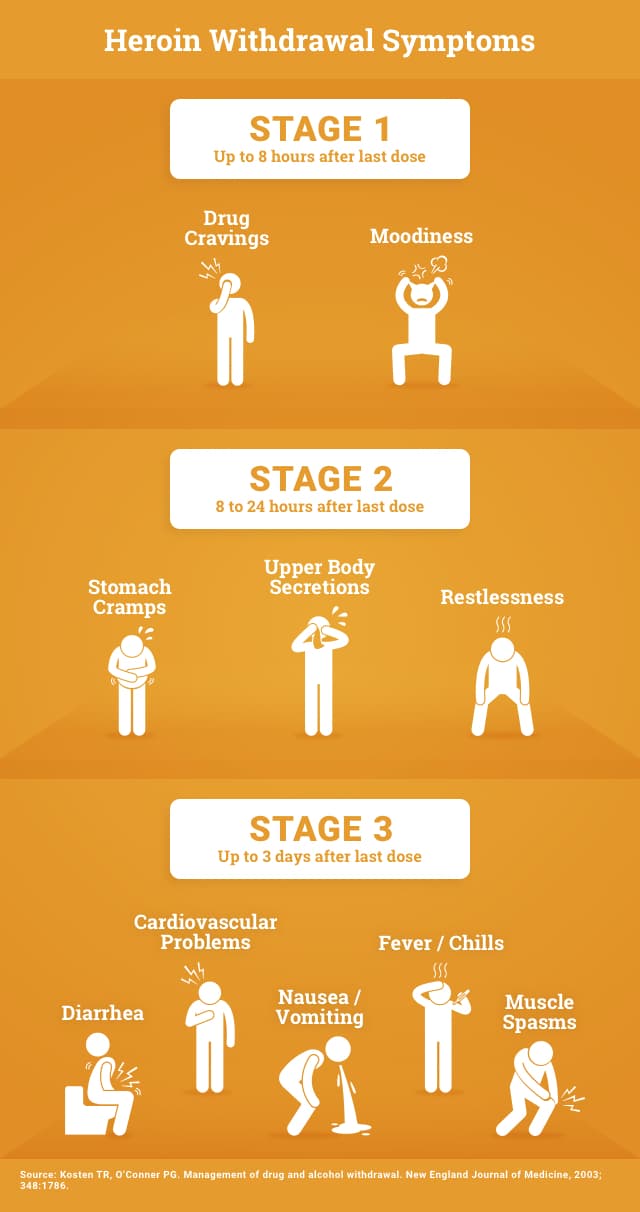Heroin Effects on the Body

Immediate Effects of Heroin Use on the Body
When someone injects heroin into a vein, the drug’s effects begin to be felt in about 7 to 8 seconds. Injecting into a muscle or under the skin produces peak effects in about 5 to 8 minutes. Though all are fast-acting routes of administration, injecting or smoking heroin allows it to reach the brain relatively faster than snorting.1,2
The heroin high is characterized by an immediate and intense rush of pleasure and euphoria.3,4 These sensations last anywhere from 45 seconds to several minutes. Once the rush of the high wears off, the user may feel drowsy and relaxed for up to an hour (being “on the nod”).3
Other effects may last 3 to 5 hours and include:5
- Dry mouth.
- Constricted pupils.
- Slowed heart rate.
- Decreased sex drive.
- Reduced appetite.
- Slurred speech.
- Suppressed breathing. 5
The way heroin affects a person will depend on:5
- Their size and weight.
- Their health.
- Their tolerance to the drug.
- Whether they use other drugs with heroin.
- How much heroin they use.
- The strength of the drug.
Need a Way Out of Addiction?
Who Answers?Long-Term Heroin Effects
Regular heroin use is associated with tolerance, dependence, and addiction.3 Tolerance means that a user needs increasingly higher doses of the drug to get the same effect they felt before. Dependence means that the user’s body becomes used to having the drug in its system and can only function normally when the drug is present.
Tolerance and dependence are both criteria used in diagnosing an opioid use disorder and are often present in people with heroin addiction. A heroin addiction can be broadly characterized as compulsive use of heroin despite health problems or problems at work, school, or home.
People who develop significant levels of opioid dependence are likely to go through withdrawal when they stop using heroin. Though the experience of withdrawal varies widely from person to person, acute heroin withdrawal symptoms may first develop between 6 to 24 hours after their last use. Symptoms peak in the first 3 days and can last up to a week.5
Chronic heroin use is associated with white brain matter deterioration – which may lead to impairments in decision-making, self-regulation and the ability to respond to stress.4
Common symptoms of withdrawal from heroin include:3,5
- Runny nose.
- Cravings.
- Restlessness.
- Agitation.
- Trouble sleeping.
- Diarrhea.
- Stomach cramps.
- Rapid heartbeat.
- Muscle and bone pain.
- Uncontrollable leg movements.
The onset of these symptoms frequently motivates individuals to continue using to relieve them.
Over time, heroin use can also lead to a deterioration in physical health. Some of the most common health problems associated with addiction to the drug are listed below:
- Liver and kidney disease
- Chronic insomnia
- Lung problems (including pneumonia)
- Damage to nasal tissue for people who snort it
- Infections in the heart lining and valves
- Collapsed veins
- Abscesses
- Chronic constipation
- Sexual dysfunction (in men)
- Irregular menstrual cycle (in women)3,5
Other Effects
In many cases, heroin addiction tends to be accompanied by lifestyle choices that are also unhealthy: recreational drugs, cigarette smoking, lack of exercise, and poor nutritional habits. The drug’s effects on the body are only worsened when the user also makes these risky health and behavioral choices.
In addition, by sharing syringes and other paraphernalia used for injecting the drug, heroin users have higher risk of developing infections through contact with infected blood or other bodily fluids. Examples of bloodborne diseases that can spread by needle-sharing include HIV and hepatitis C.3
Further, heroin often contains other substances such as sugar, starch, or powdered milk. When injected, these substances can clog blood vessels to the lungs, liver, kidneys, or brain and cause permanent harm.3
Finally, heroin users who inject can develop tuberculosis, a bacterial pathogen that commonly infects lung tissue. Although many people may have what’s known as a latent tuberculosis infection or otherwise remain asymptomatic after infection, users with HIV are more likely to have active infections.7
Learn More About Addiction and Get Help
Taking the first steps to help yourself or a loved one can feel intimidating. If you or someone you love may be suffering from an addiction to heroin, however, there are many ways to get help. Educate yourself about heroin, addiction, and treatment options that are available to you or talk to your health care provider about recommendations for programs.
Let’s verify your coverage for treatment at an American Addiction Centers location. Your information is always confidential.
Sources
[1]. Chudler, E. (2017). Neuroscience for kids: Heroin. University of Washington.
[2]. National Institute on Drug Abuse. (2018). Research report series: Heroin.
[3]. National Institute on Drug Abuse. (2018). Heroin.
[4]. Drug Enforcement Administration. (2017). Drugs of Abuse.
[5]. Alcohol and Drug Foundation. Heroin.
[6]. South Carolina Department of Alcohol and Other Drug Abuse Services. (2001). Fact sheet: Heroin.
[7]. American Psychiatric Association. (2013). Diagnostic and statistical manual of mental disorders (5th ed.). Arlington, VA: American Psychiatric Publishing.
Heroin Rehabilitation Directory
Select a state to learn more about your treatment options.- Alabama
- Alaska
- Arizona
- Arkansas
- California
- Colorado
- Connecticut
- Delaware
- District Of Columbia
- Florida
- Georgia
- Hawaii
- Idaho
- Illinois
- Indiana
- Iowa
- Kansas
- Kentucky
- Louisiana
- Maine
- Maryland
- Massachusetts
- Michigan
- Minnesota
- Mississippi
- Missouri
- Montana
- Nebraska
- Nevada
- New Hampshire
- New Jersey
- New Mexico
- New York
- North Carolina
- North Dakota
- Ohio
- Oklahoma
- Oregon
- Pennsylvania
- Rhode Island
- South Carolina
- South Dakota
- Tennessee
- Texas
- Utah
- Vermont
- Virginia
- Washington
- West Virginia
- Wisconsin
- Wyoming
Help for Heroin Addiction
Do you know someone suffering from heroin addiction? Help is available. To find out more, please choose the selection that applies to you or the person suffering from addiction:
Fill out the form below to be contacted.
Repair the damage and start fresh today!


